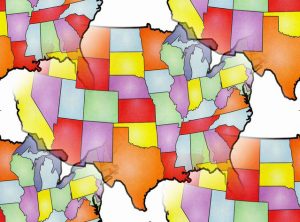If you are a marijuana cultivator in California, you might be reluctant to buy insurance on your business. But our experienced cannabis business  attorneys know there are many good reasons to invest in insurance.
attorneys know there are many good reasons to invest in insurance.
A recent article from Santa Barbara Independent reveals a big payout one cannabis farmer in Carpinteria received due to losses caused by the Thomas Fire in December, the largest wildfire in the state in recent history. The farm got more than $1 million dollars from their insurance company after thousands of marijuana plants on property were destroyed. This equated to about market value for the plants. While the farm’s crops did not burn in the fire, white ash blew into the greenhouses and tainted the plants. The plants tested positive for lead, arsenic, asbestos, and magnesium. This type of damage was covered under the policy’s clause covering changes in atmospheric conditions.
Meanwhile, most of the other cannabis farms in Northern California were not so fortunate. Many opted out of insurance policies to keep costs low. This money-saving tactic is typical among farmers of all kinds, who often skip this expense to keep profit margins higher. But this is a big gamble, particularly in an area so prone to fires. Continue reading
 Cannabis Law Group's Medical Marijuana Legal Blog
Cannabis Law Group's Medical Marijuana Legal Blog





 Chronicle
Chronicle taking place in Nebraska. Despite efforts on two different fronts to get medical marijuana on the 2018 ballot, all efforts have been halted, at least for the time being.
taking place in Nebraska. Despite efforts on two different fronts to get medical marijuana on the 2018 ballot, all efforts have been halted, at least for the time being. catching up to what California and our trusted attorneys have known for a long time: That marijuana is a safe and effective treatment for many illnesses and ailments. So safe, in fact, that laws are expanding to open up marijuana for recreational consumption as well, with California implementing
catching up to what California and our trusted attorneys have known for a long time: That marijuana is a safe and effective treatment for many illnesses and ailments. So safe, in fact, that laws are expanding to open up marijuana for recreational consumption as well, with California implementing  working with medical marijuana operations obtain compliance with the law. More recently, we’ve been on the forefront of helping recreational marijuana businesses align their operations with the regulatory parameters set forth in
working with medical marijuana operations obtain compliance with the law. More recently, we’ve been on the forefront of helping recreational marijuana businesses align their operations with the regulatory parameters set forth in  This may seem like a novel concept, but it should not be anywhere near as controversial as it has become. If a patient is taking a drug manufactured by a big pharmaceutical company and runs out of it while on vacation, they can simply go to a pharmacy location in their current jurisdiction and ask to have their prescription transferred there. This can be done permanently, or on a one-time basis, no questions asked. Typically, this is not how things work for medical marijuana patients because many states allow only residents to obtain medical marijuana from a dispensary located there. This creates obvious problems. One way to address this is by allowing medical marijuana reciprocity whereby a patient registered in one state, can travel to another state and use their home-state registration to obtain medical cannabis products.
This may seem like a novel concept, but it should not be anywhere near as controversial as it has become. If a patient is taking a drug manufactured by a big pharmaceutical company and runs out of it while on vacation, they can simply go to a pharmacy location in their current jurisdiction and ask to have their prescription transferred there. This can be done permanently, or on a one-time basis, no questions asked. Typically, this is not how things work for medical marijuana patients because many states allow only residents to obtain medical marijuana from a dispensary located there. This creates obvious problems. One way to address this is by allowing medical marijuana reciprocity whereby a patient registered in one state, can travel to another state and use their home-state registration to obtain medical cannabis products.  When legalized recreational use marijuana came to Colorado, other western states, and now California as well, the concept of cannabis tourism became possible in the U.S. The problem, however, is while it is legal to go to one of these states and purchase marijuana, assuming you are over the legal age of 21, laws prohibiting public consumption of marijuana made anything other than the use of edibles very impractical. For anyone staying in a hotel, most are non-smoking entirely, and this also includes the use of marijuana products.
When legalized recreational use marijuana came to Colorado, other western states, and now California as well, the concept of cannabis tourism became possible in the U.S. The problem, however, is while it is legal to go to one of these states and purchase marijuana, assuming you are over the legal age of 21, laws prohibiting public consumption of marijuana made anything other than the use of edibles very impractical. For anyone staying in a hotel, most are non-smoking entirely, and this also includes the use of marijuana products.  On the other hand, when California legalized marijuana, the ballot initiative was sold to many as a way for the state to generate billions of dollars in revenue. While this is certainly true, and a laudable goal, it was accomplished by setting a tax of 15 percent, which is many times higher than the tax rate set in Canada. There is also a separate tax on the cultivation of cannabis set at nine percent, which results in a direct expenses passed on to distributors and consumers as discussed in a recent news article from
On the other hand, when California legalized marijuana, the ballot initiative was sold to many as a way for the state to generate billions of dollars in revenue. While this is certainly true, and a laudable goal, it was accomplished by setting a tax of 15 percent, which is many times higher than the tax rate set in Canada. There is also a separate tax on the cultivation of cannabis set at nine percent, which results in a direct expenses passed on to distributors and consumers as discussed in a recent news article from  compliance with state and local regulations. We are experienced in civil and criminal cannabis-related cases and fight hard for the rights of our clients. We support the continued expansion of marijuana legalization and hope to see a day soon when businesses are free to operate on a national scale.
compliance with state and local regulations. We are experienced in civil and criminal cannabis-related cases and fight hard for the rights of our clients. We support the continued expansion of marijuana legalization and hope to see a day soon when businesses are free to operate on a national scale.